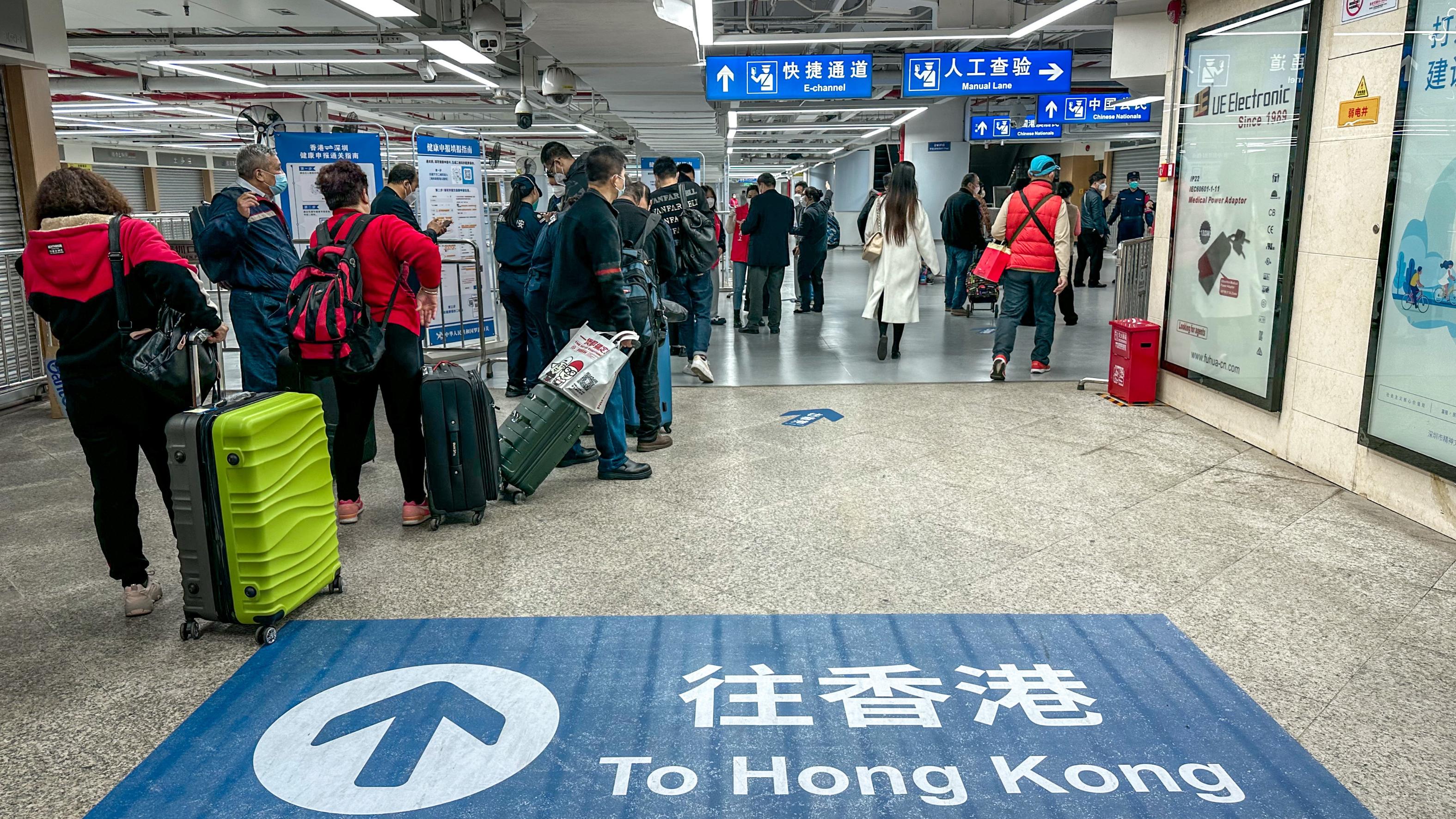 Visitors bound for Hong Kong queue up to get their health declaration information vetted at the Luo Hu checkpoint, in Shenzhen, on Feb 6, 2023. (ANDY CHONG / CHINA DAILY)
Visitors bound for Hong Kong queue up to get their health declaration information vetted at the Luo Hu checkpoint, in Shenzhen, on Feb 6, 2023. (ANDY CHONG / CHINA DAILY)
HONG KONG – Hong Kong's economy entered into positive growth territory fueled by the strong recovery of inbound tourism and domestic demand.
The city’s first quarter gross domestic product registered an annual growth rate of 2.7 percent, compared to an annual contraction of 4.1 percent in the previous quarter. GDP grew 5.3 percent on a quarterly basis, according to the government data released on Friday.
Among various components of the GDP growth, exports of services expanded visibly by 16.5 percent, as exports of travel services leapt more than six-fold due to the resumption of travel with the mainland and the rest of the world.
READ MORE: Business sentiment among HK SMEs picks up further
Private consumption expenditure surged 13 percent year-on-year along following the removal of anti-COVID-19 pandemic measures in Hong Kong and on the mainland.
Overall investment expenditure in terms of gross fixed capital formation reverted to a 5.8 percent annual growth amid an improved economic outlook.
Consumption activities expanded notably in the first quarter of 2023, as consumption sentiment improved sharply along with the removal of anti-epidemic measures in both Hong Kong and the mainland.
Adolph Leung, Government economist
Exports of goods, however, slipped further by 18.7 percent from a year ago amid the challenging external environment, though the lifting of restrictions on cross-boundary truck movements between Hong Kong and the mainland provided some relief.
“Inbound tourism and domestic demand will remain the major drivers of economic growth this year,” Government Economist Adolph Leung said at Friday’s press conference.
“Visitor arrivals should recover further while the improving economic situation and prospects should boost domestic demand.”
But the economist said that slower growth in the advanced economies and the recent banking sector stress in the Unites States and Europe will continue to weigh on external demand.
“The real GDP growth forecast for 2023 is maintained at 3.5 percent to 5.5 percent. If the current momentum of economic recovery is sustained, growth will likely be near the higher end of the forecast range,” said Leung.
Hong Kong’s economy shrank 3.5 percent last year, the third year of economic recession. The city has seen three annual economic contractions in 2019, 2020 and 2022 through the twin hits of political protests and the COVID-19 pandemic.
The International Monetary Fund, in its Regional Economic Outlook report for Asia and Pacific released in May, predicted that Hong Kong’s economy will expand by 3.5 percent this year and 3.1 percent next year.
HSBC Global Research raised its GDP forecast for Hong Kong from 3.8 percent to 5 percent for 2023, as the broadening of domestic demand and increase in visitor flows can offset headwinds such as weak goods trade and interest rate hikes. The growth rate for 2024, however, was revised downwards from 2.9 percent to 2.5 percent, due to the higher base of comparison in 2023.
ALSO READ: Bustling Hong Kong is back
Other financial institutions such as Hang Seng Bank, Singaporean-based United Overseas Bank, and Moody’s Analytics also expected Hong Kong’s economy to expand by 4 percent this year. The University of Hong Kong estimated the city should post an annual growth of 3.6 percent.
 Fans cheer as they watch a match at the Hong Kong Stadium on the second day of the rugby sevens tournament on April 1, 2023. The event attracted about 75,000 spectators. (CALVIN NG / CHINA DAILY)
Fans cheer as they watch a match at the Hong Kong Stadium on the second day of the rugby sevens tournament on April 1, 2023. The event attracted about 75,000 spectators. (CALVIN NG / CHINA DAILY)
Oxford Economics is less optimistic; senior economist Lloyd Chan estimated Hong Kong’s growth will hover around 2.2 percent in 2023 when its economic recovery is in the nascent stage. “Plus, global headwinds from rising US interest rates and slowing global demand are a significant drag,” Chan said.
READ MORE: HK's economic outlook more positive after reopening, says Chan
Heron Lim, an economist at Moody’s Analytics, cautioned: “The economy is not without vulnerabilities as it shakes off the pandemic. External demand is soft, and the tight labor market is limiting its recovery potential. Cash flow for small businesses has also been tight.”
Stephen Li, head of Global Markets at UOB Greater China, cautioned an external demand slowdown, high global interest rates, banking sector risks, and a weak domestic property market are potential headwinds.



